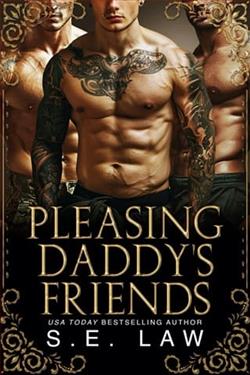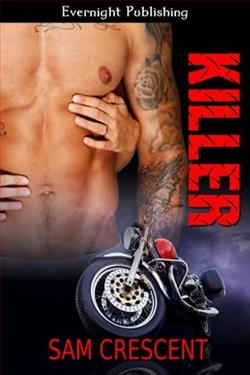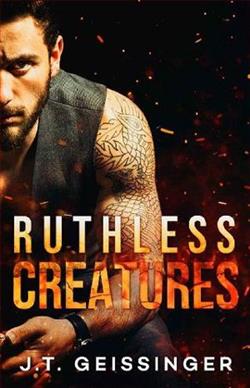Page 4 of Into Darkness (Night Prowler 6)
The sound was off in the distance, a sharp rat-a-tat that shattered the eerie quiet of Curfew. She jerked upright on her pallet, heart racing, then held perfectly still, straining her ears, awaiting the final burst.
There was always one more burst.
Through the sooty window across her cramped bedroom glowed the neon beacon of the megascreen, broadcasting the Imperial Federation’s tagline, “One World In Harmony,” throughout the district. A glance at the slowly rotating screen atop the south tower of what used to be St. Stephen’s Cathedral showed the time as 5:17pm IFST. Curfew didn’t end for another three quarters of an hour.
As another volley of gunfire rang out, Lu said a silent prayer for the poor soul who’d broken it.
A tap on her bedroom door, then her father’s head popped through. “Liebling? Ist alles in ordnung?”
He was whispering, the survivalist habit of one long used to hiding. Behind his wire-rimmed spectacles, his brown eyes shone with worry. He knew too well how much she hated the sound of gunfire.
“Yes. I’m fine,” Lu lied, noticing how deep the grooves around his mouth had become. His once-dark hair had, overnight it seemed, paled to gray. In his faded dressing gown and house slippers, he reminded her of one of the guests at the Hospice. The thought made her shiver. He still had six more years before they’d have to face that, and Lu tried hard never to think of it.
She tried hard never to think of a great many things.
He switched from German to English. “Can you go back to sleep? You still have a few hours before work.”
He looked hopeful, but they both knew she’d never go back to sleep now. Beyond the obvious horror of what gunfire during Curfew meant, there was something darker that prickled her skin and soured her stomach at the sound. Some ancient monster buried deep in her psyche blinked open yellow eyes and lifted its head, hackles raised.
That monster she feared more than anything else, even more than discovery by the Inquisitor.
“No. I think I’ll go in early today. We could use the extra credits.”
“All right. I’ll put the coffee on.” Her father swung shut the door, and Lu heard the shuffle of his footsteps all the way down the stairs.
She scrubbed her gloved hands across her face, rose from the bed, and went down the hall into the bathroom they shared. The dying rays of the sun filled their apartment with a dim red light, filtered through the cloud cover, soupy and opaque. She removed the lightweight night gloves, laid them on the ledge above the sink, and stared down at her bare hands.
Tattoos decorated the inside of both wrists. The left showed a birdcage, empty, its wire door cocked open. The right showed a trio of birds in flight, wings spread wide open as they soared. A constellation of tattoos decorated her body, including a quote from The Bell Jar, by Sylvia Plath, on her rib cage, the zodiac sign for twins on her right ankle—it spoke to her, for all its meaninglessness to reality; she was a Virgo, not a Gemini—and a fire-breathing dragon curled around her belly button, but the birds were her favorite.
When she was seventeen, she’d read Lolita by Nabokov—that one wasn’t on the banned list—and a quote from the book had stuck in her mind like a burr, refusing to shake loose. “I talk in a daze, I walk in a maze, I cannot get out, said the starling.”
The words had resonated in the deepest level of her heart. Lu understood exactly how that little starling felt. When she pressed her wrists together, seeing her own tattoo starlings fly free, it made her feel a little better.
Keeping a careful eye on the digital water meter on the wall above the tap, she brushed her teeth and washed her face, then combed her fingers through her long, wavy hair and braided it. The single plait fell nearly to her waist. She returned to her room and pulled on the Hospice’s standard-issue gray trousers and belted coat over the thin leggings and tank she’d worn to bed, then laced up her favorite pair of boots. The shoe vendor at the market had called them “combat” boots, a name Lu liked. She’d bartered ten water credits for them, a pricey trade but worth it; she spent most of her shift at the Hospice on her feet, and the boots were supremely comfortable, if ugly.
Lu didn’t care about pretty exteriors. She knew even the most beautiful things could be worm-eaten on the inside.
A quick check in the cracked mirror above the tiny bureau to make sure her appearance was in order, her usual stuck-out tongue at the reflection of the large red Third Form badge sewn into the lapel, then she made her way down the narrow staircase to the first floor.
Her father was in the kitchen, frowning at a pan of water on the stove. He turned when she came in, held out an empty tin, shrugged an apology. “Forgot to buy more matches. Can’t put the coffee on for another half hour. Sorry, liebling.”
The stove was wood burning, but also had electrical ignition switches, a hybrid necessity in a city where electricity was only available during certain hours. Lu needed neither, but her father had strictly forbidden any hint of zauber from her, no matter that they were inside and no one could possibly find out.
“It’s all right. I’ll get a coffee at work. And I’ll pick up some matches on the way home. Anything else we need from the market?”
Looking around the threadbare kitchen, her father made an amused noise she translated to Is there anything else we don’t need? Staring at the nearly empty cupboard shelves, he sighed. “It might be time for me to trade a few more books.”
“No.” Her emphatic response made her father raise his brows, and Lu shook her head. “I’ll ask for extra hours next shift. We’re not trading any more of your blacklisted books. It’s too dangerous.”
Her father chuckled and sent her a warm smile. “I think it’s not the danger you’re worried about, little bookworm. I think it’s which one of your favorites I might trade next.”
“Psh.” Lu waved the comment away, but he was right. Reading transported her to other worlds so much finer and more interesting than her own. She’d rather give her eyeteeth than give up any more books, no matter how hungry they became.
She crossed to the icebox, yanked open the door, and peered inside. She had to smother the pang of alarm at what little lurked inside. Putting on a bright voice, she said, “Okay. Breakfast. We’ve got a delicious-looking rind of”—unable to discern the color of the wedge of cheese beneath its layer of fuzzy blue mold, she sniffed—“cheddar. We’ve got a very perky head of cabbage.” Her father snorted. The cabbage was decidedly unperky. “We’ve got three cans of BioVite, two FitCakes, and something that looks like it used to be a sausage.” She paused. “Or maybe a banana.”
Her father peered over her shoulder. ?
?We haven’t had fresh fruit in weeks. Whatever that thing is, it’s definitely not a banana.”















